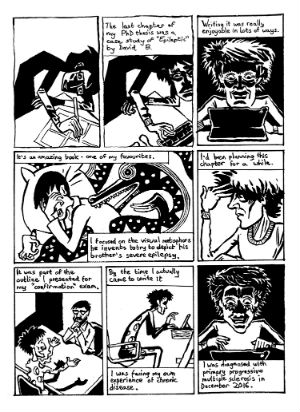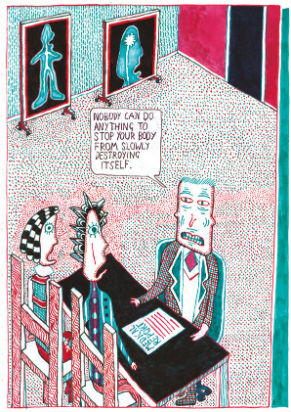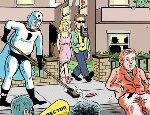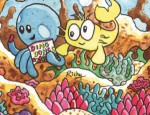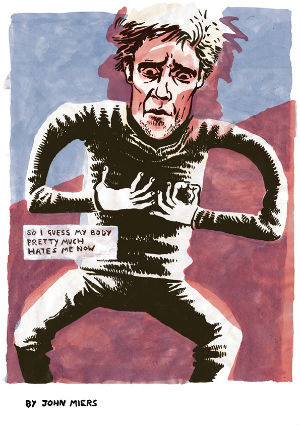 A few years ago at Broken Frontier I reviewed Score and Script, the John Miers-led exercise in practical comics scholarship. That publication saw a veritable who’s who of early 2010s small pressers and indie creators both analysing and dissecting the component parts of the comics form in an attempt to cast new light on the complex relationship between its visual and narrative elements. It’s a unique comics anthology that I consider, without even a hint of hyperbole I promise, to be just as vital and important in what it tells us about the mechanics of the form as McCloud’s Understanding Comics. And it’s still available to buy online here I note alongside some of his other self-published work.
A few years ago at Broken Frontier I reviewed Score and Script, the John Miers-led exercise in practical comics scholarship. That publication saw a veritable who’s who of early 2010s small pressers and indie creators both analysing and dissecting the component parts of the comics form in an attempt to cast new light on the complex relationship between its visual and narrative elements. It’s a unique comics anthology that I consider, without even a hint of hyperbole I promise, to be just as vital and important in what it tells us about the mechanics of the form as McCloud’s Understanding Comics. And it’s still available to buy online here I note alongside some of his other self-published work.
Miers’ most recent comics offering So I Guess My Body Pretty Much Hates Me Now is his first entry into the autobiographical comics arena. Its origins lie in his Researcher in the Archives residency at the University of the Arts London’s Archives and Special Collections Centre housed at the London College of Communication. As a project it is one of the end products of a period researching metaphor in autobio and underground comics. You can read more on the twists and turns those explorations took here on the UAL website and gain further insights into his objectives. But to bring our focus into sharp perspective, Miers’ study was linked to his own recent diagnosis of multiple sclerosis, and So I Guess My Body Pretty Much Hates Me Now presents two main comics strips (and a couple of shorts) detailing the realities of living with MS based on that research.
A single page strip (left) in the style of David B’s Epileptic and (right) in that of Mark Beyer
The first strip echoes the style of self-taught artist Mark Beyer (whose work was a mainstay of influential alt comics anthology RAW through the 1980s). Here, Miers recounts his initial diagnosis with a stark and uncompromising simplicity – “Nobody can do anything to stop your body from slowly destroying itself” – and depicts a subsequent MRI scan as an NHS patient at a private facility as part of a medical trial. The deliberately naïve visuals and almost abstract sense of design, with its incongruous metaphorical elements and skewed anatomy and perspectives, ironically works to add an extra level of humanity and immediacy to these reflections on the feelings of unfairness, helplessness and isolation that a life-changing diagnosis brings. There are also perhaps interesting parallels here in Miers’ dislocated experience as an outsider within this environment and Beyer’s own status as an oft-referred to “outsider artist”.
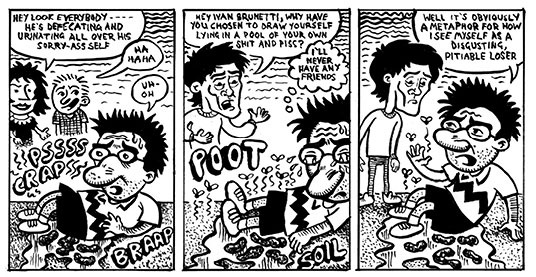
In the second story (sample above) Miers initially reappropriates the style and a key sequence of Ivan Brunetti’s Ignatz-winning Schizo to mirror a very different aspect of his experience. Where Brunetti uses incontinence as a metaphor for anxiety, Miers acts as interloper within a resampling of Brunetti’s strip which becomes a launching pad for a very real account of loss of bodily control (another symptom of his multiple sclerosis) before a key work presentation. With an incongruously jaunty underground cartooning style that embodies the dark scatological humour that permeates these pages, Miers again underlines the way in which our emotional perceptions, connections and relationship with the page are manipulated and controlled by its varying structures.
So I Guess My Body Pretty Much Hates Me Now affects us as a reader in two very distinctive ways. In our empathy with its protagonist as a piece of raw and affecting autobio but also in what it has to say about the narrative tools of the form and our comprehension of them. Miers has long been one of the unsung figures of the UK small press scene. Pick up both this and Score and Script to understand his importance as both creator-facilitator and comics scholar.
For more on the work of John Miers visit his website here and his online store here. Follow John on Twitter here and on Instagram here.
Review by Andy Oliver





